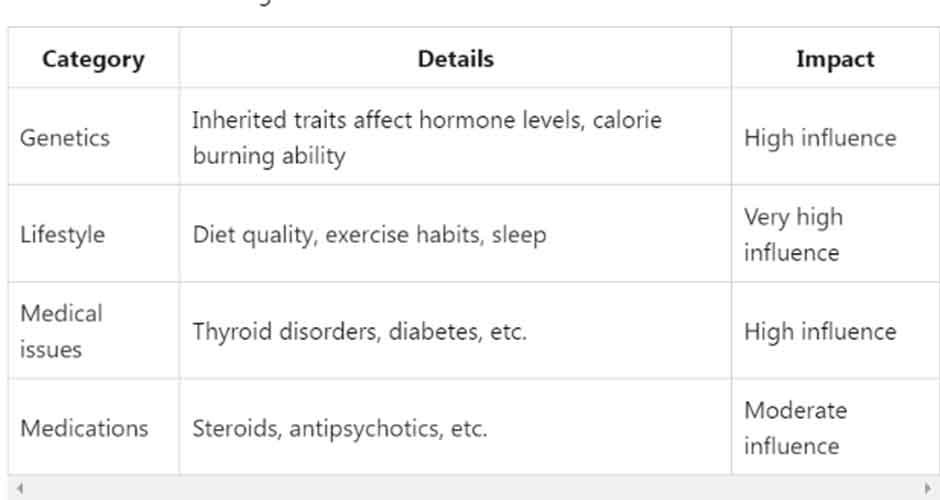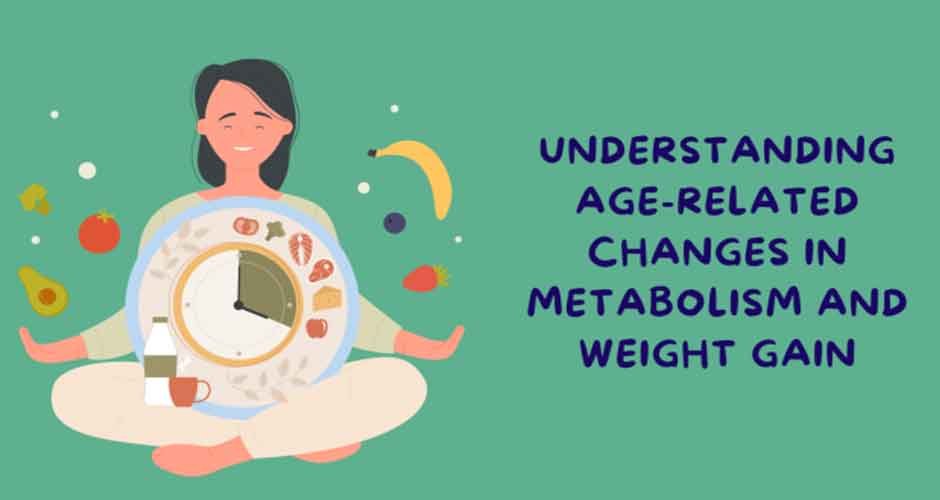As we age, changes occur in our body that can make maintaining a healthy weight more challenging. Our metabolism, the chemical engine that drives calorie burning, slows down over time. Understanding these metabolic shifts empowers us to proactively manage our weight as we age.
The Intricate Metabolism-Weight Connection
- Over 70% of American adults aged 20 and over are overweight or obese.
- Metabolism refers to all the biochemical processes that maintain life, including converting food into energy, regulating hormones, and repairing cells.
- As we age, our metabolism naturally slows down. Checking in with an adult primary care provider can help us understand the reason for the change and act accordingly.
- Staying active, along with that, can offset this slowdown and help maintain a healthy metabolism.
- As metabolism changes with age and starts burning fewer calories, gaining weight becomes easier if you eat the same amount.
- Understanding these metabolic shifts can lead to lifestyle changes to improve weight and health as we age. Small diet adjustments, increased exercise, stress reduction, and sufficient sleep can all help balance metabolism.
- Monitoring our metabolism as we age is crucial for maintaining a healthy weight and preventing obesity later in life. Even small positive changes make a difference.
Effectively managing age-related metabolic changes is crucial for healthy aging and preventing excess weight gain over time.
Peak Metabolism: The Glory Days
During our youth, our metabolism runs like a well-oiled machine, effortlessly burning through calories due to our high muscle mass and robust hormone levels.
- The basal metabolic rate (BMR)range for younger adults is 1,800-2,200 calories per day for men and 1,600-2,000 calories per day for women.
- Muscle tissue burns about 6 calories per pound per day, while fat tissue burns about 2 calories. More muscle means a higher metabolism.
However, this metabolic efficiency starts to decline as we enter our late 20s and 30s.
Midlife Metabolic Transformations
After the age of 30, small but steady metabolic changes unfold each decade:
- The basal metabolic rate decreases by 1-2% per decade. By age 50, this represents a 10-20% drop compared to early adulthood.
- Muscle mass declines 3-5% per decade after age 30 if strength training is not performed. Less muscle directly lowers metabolic rate.
- Weight gain surges for both men and women during midlife, with an average gain of 1-2 pounds per year.
Muscle tissue burns about 6 calories per pound per day, while fat tissue burns about 2 calories.
Metabolic Slowdown: When Efficiency Backfires
Our resting metabolic rate accounts for about 70% of our total calorie expenditure. After age 40, this resting metabolism can drop by:
- 2-4% per decade
- 7 calories per pound of body weight per decade
This slow, insidious decline is primarily driven by the loss of muscle mass and drops in key hormones.
Impact of Diminishing Muscle
- Each pound of muscle burns about 6 calories per day at rest, while fat burns about 2 calories per day.
- Without strength training, adults lose over 5 pounds of muscle per decade after age 50.
- Preserving muscle is key to bolstering metabolism, as it directly influences resting calorie expenditure.
Several hormones also diminish with age, reducing calorie burn. Here is a table showing how metabolism is affected by lifestyle habits in adulthood:
| Following Good Habits | Not Following Good Habits | |
| Exercise | Lift weights twice a week to keep muscles strong | Don’t lift weights; muscles get weaker |
| Muscles | Lose muscle slowly over time | Lose muscle faster over time |
| Metabolism Rate | It slows down 1-2% every 10 years | Slows down 2-4% every 10 years |
| Calories Burned | It burns more calories because it keeps more muscle | It burns fewer calories because it loses muscle |
| Diet | Eat healthy foods like veggies, protein and whole grains | Don’t eat as healthy, more processed foods |
| Weight | Gain weight slowly and steadily | Gain weight faster, 1-2 pounds every year |
The main point is that small, healthy habits like exercise and eating right make your metabolism stay higher as you get older. This makes it easier to keep off extra weight. Letting healthy habits slide makes your metabolism slow down more quickly.
Hormonal Shifts That Slow Metabolism
- Growth hormone decreases by about 14% per decade after 30 years old. This hormone has powerful fat-burning effects.
- Menopause drives down estrogen levels, triggering increased belly fat storage in women over 50.
Additionally, the body progressively loses some of its ability to self-regulate appetite hormones, like leptin and ghrelin. Combined, these changes promote:
- Gradual fat gain, particularly in the abdomen
- Rising hunger levels
- Decreased calorie burning during rest
Now let’s unravel what really controls how powerfully age impacts our metabolism.
Table: Factors Influencing Metabolic Health Over Time

Lifestyle choices like staying active and eating well have far more influence on metabolism than aging itself.
Although genetic luck does play a role, daily habits wield the most power over metabolic health, as confirmed by research.
Slowing Metabolic Aging Through Lifestyle
While some degree of metabolic decline is inevitable with chronological aging, the rate and degree of this slowing come largely down to controllable lifestyle factors.
Preserve and Build Lean Muscle
- Adult muscle mass decreases by 3–5%per decade after age 30. Staying active mitigates this.
- Strength training is highly effective, triggering metabolism boosts lasting up to 48 hours post-workout.
- Just two strength sessions per week can increase resting calorie burn and improve body composition in older adults.
Emphasize Metabolism-Friendly Nutrition
- Protein intake triggers 25% greater calorie burning than fat or carbs. Older adults need more protein to preserve muscle.
- Complex carbs like vegetables, fruits, and whole grains provide vitamins, minerals, and fiber to operate metabolism efficiently.
- Capsaicin, green tea, and magnesium support metabolic health. Deficiencies are common in older adults.
Gradually shifting to metabolism-optimizing nutrition and consistent strength training can help defy age-related metabolic decline.
Frequently Asked Questions
- Is weight gain inevitable, or can we maintain metabolism?
Metabolic decline does occur naturally, but implementing proactive lifestyle strategies can dramatically slow this process. Maintaining excellent fitness and nutrition can preserve metabolism and prevent significant weight gain.
- Do hormone treatments help manage metabolic aging?
Hormone replacement therapy can provide benefits for select individuals with confirmed hormone deficiencies. However, optimizing natural hormone levels through sound sleep, stress management, and strength training should be prioritized.
- What is the best diet for healthy metabolic aging?
No single “metabolism diet” exists, as individuals have unique needs. However, diets high in lean proteins, fiber-rich complex carbs, and healthy fats support metabolic health. These provide balanced nutrition without the unnecessary cutting of calories or macronutrients. Consulting a nutritionist or registered dietician can help develop an optimal eating plan.
Key Takeaways
- Metabolic rate and muscle mass inevitably decline slowly over decades of aging. However, lifestyle powerfully impacts the degree of slowing.
- Strength training is crucial for combating age-related muscle loss that drags the metabolic rate down. Just two sessions per week can make a difference!
- Balanced nutrition supports healthy metabolic aging. Ensure adequate intakes of lean proteins, complex carbs, fiber, and healthy fats.
Understanding age-related metabolic shifts allows us to proactively develop strategies for maintaining excellent metabolic health and body composition over time. Small daily choices compound mightily over years and decades. We hold more power than we realize!
Take control of your metabolism destiny by progressively implementing metabolism-enhancing lifestyle tweaks today.

